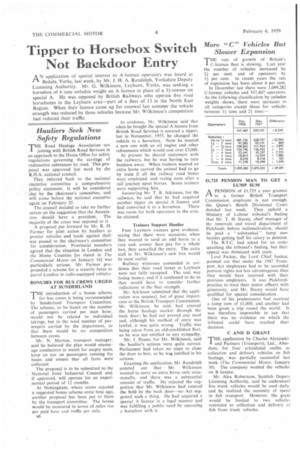Tipper to Horsebox Switch Not Backdoor Entry
Page 80

If you've noticed an error in this article please click here to report it so we can fix it.
A N application of special interest to A-licence operators was heard at Bedale, Yorks, last week, by Mr. J. H. A. Randolph, Yorkshire Deputy Licensing Authority. Mr. G. Wilkinson, Leyburn, Yorks, was seeking a horsebox of 6 tons unladen weight on A licence in place of a 31-tonner on special A. He was opposed by British Railways who operate five road horseboxes in the Leyburn area—part of a fleet of 13 in the North East Region. When their licence came up for renewal last summer the vehicle strength was reduced by three vehicles because Mr. Wilkinson's cbmpetition had reduced their traffic.
In evidence, Mr. Wilkinson said that when he bought the special A licence from British Road Services it covered a tipper. but in November, 1955, he changed the vehicle to a horsebox. Now he wanted a new one with an oil engine and other refinements which would cost over £3,000.
At present he shared customers with the railways, but he was having to turn business away. When trainers wanted an extra horse carried the animal had to go by train if all the railway road boxes were employed, and racing soon after a rail journey upset horses. Seven trainers were supporting him.
Answering Mr. T. B. Atkinson, for the railways, he said that he had acquired another tipper on special A licence and had converted it to a horsebox. There was room for both operators in the area. he claimed.
Trainers Support Haulier Four Leyburn trainers gave evidence, saying that there were occasions when they wanted to send an odd horse to a race and, sooner than pay for a whole box, they cancelled the entry. The extra stall in Mr. Wilkinson's new box would be most useful.
Railway witnesses contended in evidence that their road boxes at Leyburn were not fully occupied. The unit was losing money. and if it continued to do so they would have to consider further reductions in the fleet strength.
Mr. Atkinson submitted that the application was unusual, but of great importance to the British Transport Commission. Mr. Wilkinson. he said. had entered the horse haulage market through the back door; he had not proved .any need and, although his method of entry was lawful, it was quite wrong. Traffic was being taken from an old-established fleet. so he was not entitled to any sympathy.
Mr. J. Evans, for Mr. Wilkinson, said the haulier's actions were quite correct. Parliament had taken no steps to close the door to him. so he was justified in his actions.
Granting the application. Mr. Randolph pointed out that Mr. Wilkinson wanted to carry an extra horse only occasionally, and there was a substantial amount of traffic. He rejected the suggestion that Mr. Wilkinson had entered the field by the back door—no Act suggested such a thing. He had acquired a special A licence in a legal manner and was fulfilling a public need by operating a horsebox with it.




























































































































